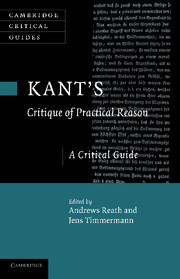Book contents
- Frontmatter
- Contents
- Preface
- List of contributors
- Translations and abbreviations
- Introduction
- 1 The origin and aim of Kant's Critique of Practical Reason
- 2 Formal principles and the form of a law
- 3 Moral consciousness and the ‘fact of reason’
- 4 Reversal or retreat? Kant's deductions of freedom and morality
- 5 The Triebfeder of pure practical reason
- 6 Two conceptions of compatibilism in the Critical Elucidation
- 7 The Antinomy of Practical Reason: reason, the unconditioned and the highest good
- 8 The primacy of practical reason and the idea of a practical postulate
- 9 The meaning of the Critique of Practical Reason for moral beings: the Doctrine of Method of Pure Practical Reason
- Bibliography
- Index
4 - Reversal or retreat? Kant's deductions of freedom and morality
Published online by Cambridge University Press: 06 August 2010
- Frontmatter
- Contents
- Preface
- List of contributors
- Translations and abbreviations
- Introduction
- 1 The origin and aim of Kant's Critique of Practical Reason
- 2 Formal principles and the form of a law
- 3 Moral consciousness and the ‘fact of reason’
- 4 Reversal or retreat? Kant's deductions of freedom and morality
- 5 The Triebfeder of pure practical reason
- 6 Two conceptions of compatibilism in the Critical Elucidation
- 7 The Antinomy of Practical Reason: reason, the unconditioned and the highest good
- 8 The primacy of practical reason and the idea of a practical postulate
- 9 The meaning of the Critique of Practical Reason for moral beings: the Doctrine of Method of Pure Practical Reason
- Bibliography
- Index
Summary
KANT'S CHANGE OF MIND
It is one of the unsettling lessons of Kant's critical philosophy that even the most painstaking conceptual analysis does not justify applying the concepts analysed. On a purely analytic level, much can be said about unicorns, bachelors or God, but it is an entirely different question whether there are such fantastic creatures, i.e. whether there is something to which we refer when we avail ourselves of these words in conversation. In philosophy, practical as well as theoretical, this problem is particularly acute when these concepts rest on synthetic judgments a priori. For instance, the analytic sections of the Groundwork of the Metaphysics of Morals are intended to convey a precise impression of what morality means. The principle of morality, Kant argues, is stated with due philosophical precision for the first time ever in the history of ethical thought. But to dispel the sceptical concern that morality might not be real he has to embark on quite a different project. He needs to show that morality is more than a nice idea that quick-witted philosophers can analyse to their hearts' content, while in practice it does not, and cannot, determine human action. After all, it is impossible to point to a morally valuable action in experience, even in principle, be it from the third- or the first-person point of view.
Keywords
- Type
- Chapter
- Information
- Kant's 'Critique of Practical Reason'A Critical Guide, pp. 73 - 89Publisher: Cambridge University PressPrint publication year: 2010
- 32
- Cited by

